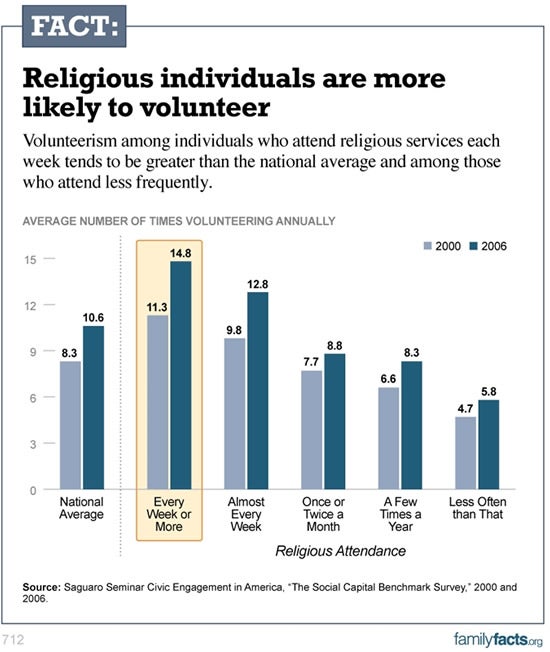Amidst the bustle of shopping for gifts, baking cookies, and wrapping presents, many Americans will celebrate this holiday season at places of worship, expressing their thanks for the blessings of another year. The religious practice and belief of Americans at the holidays and year-round signal good news for civil society and limited government.
Decades of sociological research provide evidence of the connection between religious practice and a strong and vibrant civil society. As new charts on FamilyFacts.org demonstrate, individuals who frequently attend religious services are more likely to donate to charities, often making larger donations, and are more likely to volunteer, as the chart below shows. (article continued below)
In fact, volunteerism among those who attend religious services at least once a week tends to exceed even the national average. Those regularly seated in pews are also more likely to perform informal acts of compassion, like giving blood or helping the homeless.
Unfortunately, the positive influence of religious belief and practice on civil society can be overlooked during the month of December in the perennial arguments over the place of faith in the public square.
Annual attacks on the mere mention of religious tradition in public are but a part of a continuing series of intrusions in individuals’ and institutions’ practical application of their beliefs. Other challenges have ranged from undermining the hiring freedoms of faith-based service providers to the placements of church-led foster care and adoption agencies. Medical practitioners’ rights of conscience have also been undermined by the Obama’s Administration’s partial rescission of federal regulations that had provided conscience protection.
If religious beliefs and values are to be more than empty mantras or clichés, they must be substantiated in the actions individuals take and the choices they make. The founding fathers understood that religious freedom is an inherent natural right and recognized it as the cornerstone of the American experiment. The free expression of religious belief should extend to individuals and religious organizations choosing to serve society. As Heritage’s Jennifer Marshall writes about the American model of religious freedom:
Attempts to relegate religion to private life or to prevent religious institutions from conducting their business according to their beliefs threaten this fundamental freedom. Religious individuals and institutions should be free to exercise their religious belief within their private spheres as well as to engage publicly on the basis of religion.
The majority of Americans strongly believe in God, and many choose to act on that faith through volunteering, charitable giving, and living according to their consciences. Vigilance is required to ensure that those individuals can freely live according to their beliefs.
Download the latest data, charts, and research briefs on family and religious practice at FamilyFacts.org. You can also stay updated on policy changes affecting the family and religious practice by subscribing to the DeVos Center’s weekly newsletter, Culture Watch.


























